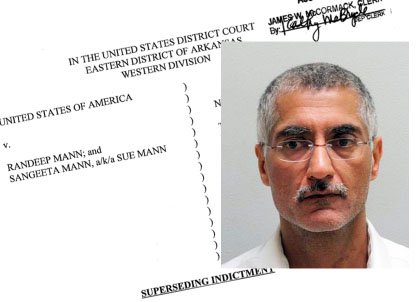LITTLE ROCK — As the first week of testimony in a federal bombing trial ended Friday, prosecutors focused jurors’ attention on possible motives behind a Feb. 4, 2009, explosion that partially blinded the chairman of the state Medical Board.
They presented a string of witnesses who described acrimonious encounters between Dr. Randeep Mann, who is accused of masterminding the explosion, and Dr. Trent Pierce, who since 2006 has been chairman of the board that licenses and regulates physicians.
Pierce, 55, has been on the 14-member board since 1997.He was severely injured in the explosion that occurred about 7:50 a.m. in his West Memphis driveway as he moved a grenade-rigged spare tire that someone propped up against the front bumper of his Lexus sport utility vehicle.
Pierce was preparing to drive to his nearby medical office to see patients before heading to Little Rock for a board meeting that would require him to stay overnight.
Special section
The explosion burned skin off his face, destroyed his left eye socket and broke several bones. Doctors have testified that they at first didn’t think he would survive. He ended up spending41 days in a Memphis trauma center and continues to receive treatment for his injuries, although he went back to work last August.
Federal prosecutors say Mann was angry that in 2003 and 2006, the board temporarily suspended his Drug Enforcement Administration permit, which authorized him to prescribe controlled substances.
Peggy Crier, the board’s executive secretary, on Friday verified that on several occasions in 2007 and 2008, Mann asked the board to consider lifting the 2006 suspension.
The board repeatedly refused to reconsider the matter. Then on Dec. 11, 2008, the board sent a letter that informed him that board members had voted to allow him to appear before them in June 2009 - “at which time you will have been without your DEA license for three years” - to state his case for having it reinstated.
But, Mann was also informed in late 2008 or early 2009 that a patient had filed a new complaint against him and that the board had asked the state Department of Health to investigate. The department conducts investigations at the board’s request, and the board makes disciplinary decisions based on the findings of those investigations.
Asked what action the board would take against Mann if it determined that the allegations in the latest complaint were true and that he had violated a 2006 consent order agreeing not to dispense controlled substances, Crier said, “They would lift the stay that was on the [license] revocation and his license would be revoked.”
Mann’s prescription-writing permit was initially suspended after allegations that he had overprescribed narcotics for some patients who later died. Mann maintained that the patients died because they didn’t take the medicines as he had prescribed them.
The inability to prescribe controlled substances substantially affected Mann’s ability to make a living, prosecutors have said.
On Friday, during Crier’s testimony and that of Nell Smith, a former Arkansas Democrat-Gazette reporter who covered the medical board meetings and interviewed Mann, prosecutors tried to show Mann’s increasing frustration with the board and with Pierce, in particular, in the months before the bombing.
They introduced three lawsuits that Mann filed against board members in which he complained that the discipline against him was discriminatory because he is a native of India. One of those lawsuits was filed after the bombing and is still pending.
Although Mann wasn’t officially served with a subpoena to respond to the new allegations until Feb. 18, 2009 - 14 days after the explosion- Crier testified that the investigation had begun before Jan. 30 and that Mann probably knew that.
Two certified court reporters verified transcripts that they had prepared of recorded proceedings before the board dating back to 2003 in which Pierce took a lead role in questioning Mann about his prescription-writing practices.
Pierce chastised Mann in some instances, saying at one point, “If you’re having multiple overdoses, there is a problem with your practice or you’re extremely unlucky,” and he strongly suggesting that “you re-examine your practice and your prescribing.”
One of the court reporters, Dennis Pierce, who is no relation to Dr. Pierce, described the atmosphere as “tense” at a July 2006 meeting where he sat at the same table as Mann.
“Dr. Pierce made it clear that he did not want Dr. Mann to have a DEA permit?” a prosecutor asked.
“Absolutely,” the court reporter replied.
Smith, the newspaper’s former health reporter, described comments she heard as a hearing was winding down, after the court reporters had stopped recording proceedings.
“Dr. Pierce said he did believe that Dr. Mann overprescribed and was afraid that he [Mann] would be back before the board,” Smith said. She said she interviewed Mann after the meeting, and he “called them a hostile board.”
Smith said that at a 2007 hearing at which Mann unsuccessfully asked the board to reinstate his permit, “Dr.Pierce said he couldn’t believe that Dr. Mann was back before the board to request the ability to reapply for his DEA permit.”
Smith also recalled Dr. Pierce “shaking his finger” at Mann in a board meeting in 2003.
On cross-examination by defense attorneys Blake Hendrix and Erin Cassinelli Couch, the witnesses agreed that other board members had been more outspoken than Pierce in trying to prevent Mann from having his permit reinstated.
Crier testified that by law, the board has to report any actions it takes against Arkansas doctors to the National Practitioners Data Base, as well as the Federation of State Medical Boards, which could affect the doctors’ ability to practice medicine in other states.
Crier also confirmed that the state Medical Board had received specific inquiries about Mann from Iowa and Massachusetts and from Health Link in St. Louis. She didn’t say if the inquiries were related to job applications from Mann.
Front Section, Pages 1 on 07/17/2010
